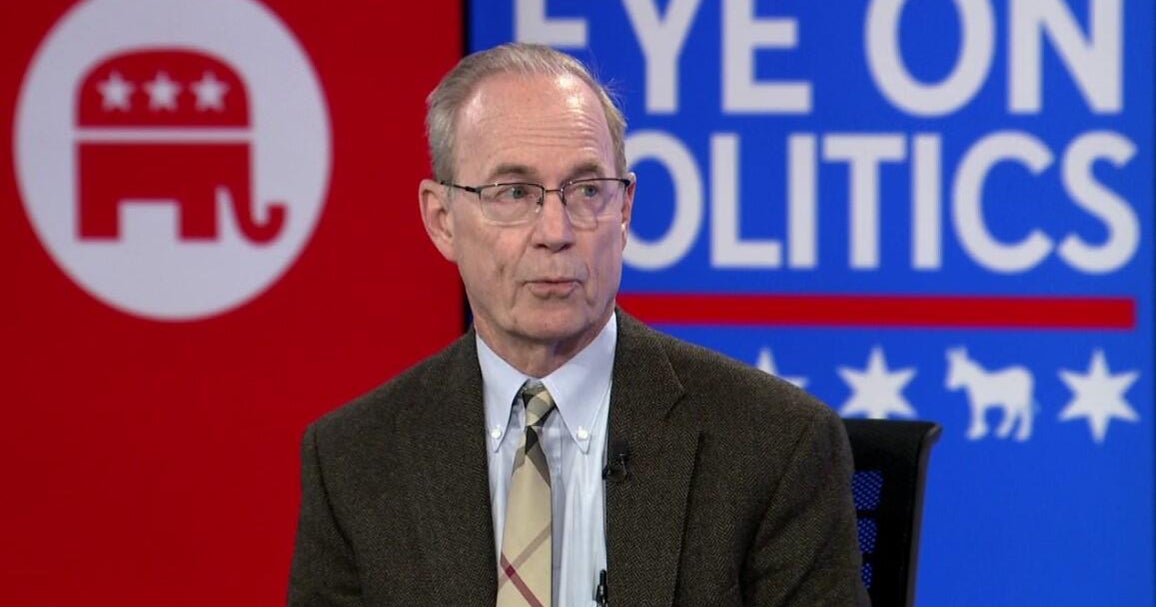Transcript: Dr. Scott Gottlieb on "Face the Nation," May 15, 2022
The following is a transcript of an interview with Dr. Scott Gottlieb that aired Sunday, May 15, 2022, on "Face the Nation."
MARGARET BRENNAN: And we turn now to Dr. Scott Gottlieb, former Trump FDA commissioner and Pfizer board member. Good morning to you, Doctor.
DR. SCOTT GOTTLIEB: Good morning.
MARGARET BRENNAN: I want to tap into your perspective as someone who ran the FDA. You just heard the administration's view that this baby formula shortage is really the failure of one company here and that the FDA isn't necessarily fully responsible for ensuring things at that plant. I wonder how you respond to that.
DR. GOTTLIEB: Well, these were persistent problems that appear to have been handled poorly, certainly by the company. FDA didn't exert all the oversight that they could have of that facility. There were known problems with that facility going back many years or findings on previous inspections. The agency had a 34-page whistleblower report in hand, making pretty serious allegations that there was data falsifications and data falsification information withheld from inspectors. So these should have prompted more aggressive action earlier. I think now that that facility has been shut by Abbott and production isn't going on. It's going to be hard to clear the facility. The overhang of allegations of data falsification are going to be the kinds of allegations that are hard for the agency to clear. Even if they're not able to prove a causal relationship between the infections that we saw in children and the facility itself which- with which so far the agency hasn't been able to prove, and they may never be able to prove that.
MARGARET BRENNAN: Mm hmm. You just said that the FDA didn't do all it could. We know they didn't inspect the Abbott facility back in 2020. They stopped inspecting some places during the pandemic that weren't mission critical. Isn't baby formula mission critical? How does the facility not get inspected by the FDA?
DR. GOTTLIEB: Well, look, it is mission critical, and during the government shutdown, we actually preserved inspections of infant formula plants because of the risks associated with those facilities--
MARGARET BRENNAN: When you were in office.
DR. GOTTLIEB: --probably should have been inspected, especially – when I was in office – especially given the fact that there had been prior findings there. The fact that FDA went into that facility this year and found five different strains of Cronobacter, that is a serious concern. It doesn't appear to have been a state of the art facility based on the findings in that 483. So they should have been under close supervision. Look, we have we have sort of the worst of both possible worlds right now. We have a regulatory scheme that stringent enough that does create obstacles to getting into the market for new entrants. There's only been one new entrant in the last 15 years that's a domestically based manufacturer, company by heart. But at the same time, it doesn't provide stringent enough oversight of the resulting oligopoly. Three companies control 80% of the market to ensure that there's no snafus that can cause shut down those facilities. And so when you do have a shutdown, when the market's that concentrated, it creates these distributed shortages that we're seeing right now that are very hard to resolve. They're going to eventually need to get that facility reopened. The timeline for that is very unclear right now.
MARGARET BRENNAN: And that's what I wanted to ask you. I'm sure the FDA commissioner will be questioned about that on Capitol Hill this week. But you said it's a broken market and you're pointing to regulation failures. That whistleblower report said they failed to maintain proper records and released untested baby formula. There's all sorts of allegations in here. Does this sound like criminal behavior to you?
GOTTLIEB: Potentially. And that whistleblower report was sent to the head of the Office of Criminal Investigations at FDA. So it does appear to be a sophisticated whistleblower. Remember, this division at FDA is nine people and it was even fewer people when I was there. It's grown in recent years and we made some budget requests to increase the size of that group. So the entire industry in this country is overseen by nine people. This has been an under-resourced part of the agency for a very long time, and that's contributing, I think, to these challenges that the agency is facing, trying to exert more vigorous and more efficient oversight. Yeah, those allegations are going to be very hard to clear. And another issue may be that the people who the whistleblower has implicated in FDA has interviewed that whistleblower may be the same people now making representations to the agency about the safety of that facility. And if that's the case, that's going to complicate issues.
MARGARET BRENNAN: We have more to talk about with you as always. So stay with us. And on the other side of the break, we'll continue the conversation. So stay with us on Face the Nation.
(COMMERCIALS)
MARGARET BRENNAN: Welcome back to Face the Nation. We want to continue now with former FDA commissioner and Pfizer board member Dr. Scott Gottlieb. Dr. Gottlieb, we've been talking about the baby formula shortage. I want to ask you about COVID, but just to pick up on something you said, I think you told me there are only nine people who oversee the entire baby formula industry in this country. Nine?
GOTTLIEB: That's right. And I think I think there were, I believe, there were three when I started at the FDA. We got some more resources for that group. There's been more resources added since then, and there's a budget request from the current administration to add four more people. But yeah, only nine people right now oversee, oversee the entire industry in the United States. And it was less than that just several years ago.
MARGARET BRENNAN: That's astounding. Let me ask you about COVID. We had this horrendous milestone this week of 1 million deaths over the entire course of this pandemic. Right now, we're averaging about 326 deaths a week. So we've come a far way. But we heard from both Dr. Fauci and Dr. Walensky this week that they have started putting on masks when they go indoors. Once again, there's concern about an uptick. What do you see in terms of trend lines? Where are we?
GOTTLIEB: Well, look, we're definitely seeing a surge of infection, particularly in the Northeast and parts of the mid-Atlantic right now. If you look at the modeling going on in those states, states like Connecticut, New York, it does appear that the infections are peaking right now. It's mostly a wave of infection driven by B.2 and this new Omicron variant B.2.12.1 that appears to be more contagious and have more immune escape than prior variants of Omicron. It looks like most of the people who are getting infected aren't people who are previously infected with B 1. But some portion of the 40% of people who escaped the prior wave of Omicron and are now getting caught by this current wave. I do believe that cases will continue to come down. Wastewater data collected by cities does show overall cases coming down and that we shouldn't have a big wave of infection this summer. Although there are models floating around the administration, it does show a big wave of infection this summer. The bottom line is, we didn't see that in 2020. We didn't see it in 2021 when B117 emerged in the spring. So this summer should be a backstop against continued spread of this variant, but it does pose a risk for the fall. And it's going to be important to learn whether or not the new newly-formulated vaccines that are now in development will cover this B2 variant well. Hopefully they will. I believe they will, but that remains to be seen.
MARGARET BRENNAN: So you reject the idea of a summer surge, even though scientists like Dr. Birx, who was on this program just a few weeks ago, is predicting and seeing a trend line that makes her very concerned that could happen because it's happened before.
GOTTLIEB: Yeah. And there is a model that the White House was briefed on last week that shows a big surge of infection in the summer driven by B2 as it moves into the Midwest and the West. I mean, it is certainly possible, but other people disagree with that model. There is the potential that you see a slow burn through the summer. I think it's more likely that you're going to see infection levels come down. Remember, we thought that there was going to be a big surge last year and this summer with B117 when it emerged in the spring. And as we got into the later spring, infection levels came down. We had a relatively quiet June in July, and then Delta came along in late August and started to create a new wave of infection. I think that's probably the pattern we're going to see again, where June, July, relatively low people do feel safe again. And then as we head into the late summer, probably B.2.12.1 is going to emerge or B2 mostly in the south.
MARGARET BRENNAN: Dr. Gottlieb, we'll be watching that. Thank you for your insight, as always.



